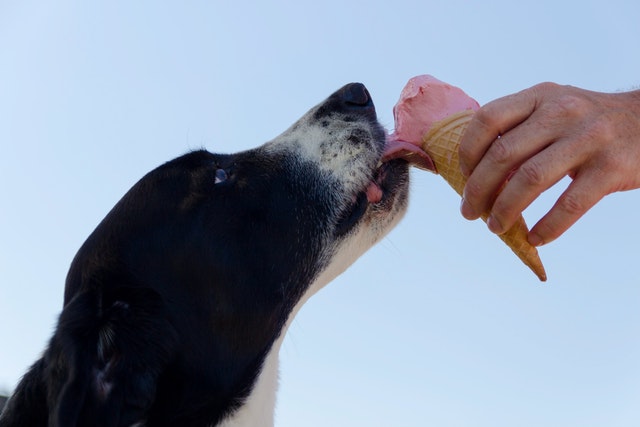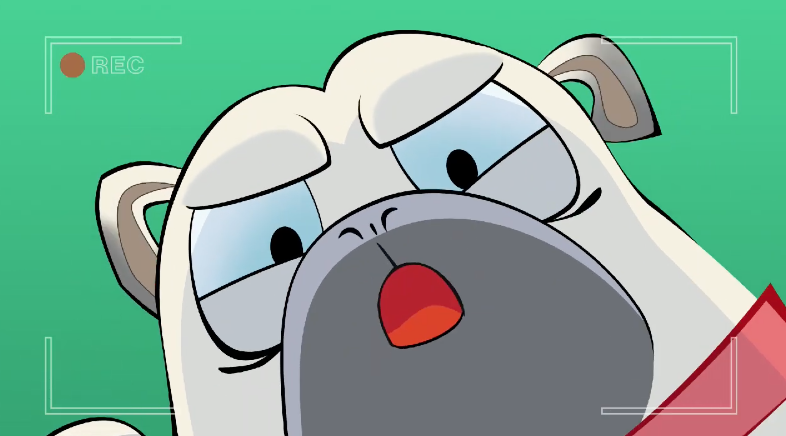

Can My Dog Eat Ice Cream?
As cute as it seems to share your delicious dessert with your fluffy friend, it’s best to keep your dog far away from any ice cream. Here’s why.

Writer Animalia Team
6 min read

As a wise (and hungry) man once said, you can’t buy happiness, but you can buy ice cream – and that’s pretty much the same thing. But beware, pup parents! As cute as it seems to share your icy dessert with your fluffy friend, it’s best to keep your dog far away from any ice cream. Here’s why.
Why Is Ice Cream Dangerous for Dogs?
There are several reasons why some ingredients in ice cream can be dangerous for dogs.
Dogs don’t digest milk very well
Ice cream recipes are usually based on dairy products. That means they contain lactose. Due to evolution, canine metabolism is more sensitive to lactose than that of humans- after all, wild dogs didn’t normally consume dairy in their natural habitats.
Dogs have an enzyme that processes their mother’s milk as puppies. When they grow up, the amount of that enzyme (lactase) in their organism reduces significantly. Most adult dogs are naturally intolerant to lactose and their system can’t properly break down dairy products.
Milk-based ice cream can cause mild to severe digestive issues in dogs, such as gas, stomach pain, vomiting, diarrhea, and loose stools.

Ice cream can contain toxic ingredients for dogs
Many types of ice cream are dangerous for pups, mainly due to three ingredients: – theobromine, caffeine, and xylitol.
Theobromine
Theobromine is the main ingredient in chocolate that is toxic to dogs. Since dogs cannot metabolize theobromine as quickly as humans it is possible for it to build to a dangerously high level within their system and cause chocolate toxicity, a sometimes fatal illness. Although not all types of chocolate have the same levels of theobromine it is best to keep any chocolate products far far away from your four-legged friend. Dark and bitter chocolate products have the highest amount of these compounds and if your ice cream is chocolate-flavored or contains chocolate in any form, it is strongly advised by all veterinary professionals to not feed it to your dog. Ingestion of chocolate can cause various health issues such as diarrhea and vomiting, muscle tremors, increased heart rate, and high blood pressure.
Caffeine
As far as caffeine goes, you are allowed to name your dog Cream and Sugar – but never share the caffeinated treat with them! If you allow your dog a lick or two, you probably wouldn’t have anything to worry about – however, coffee beans as an ice cream ingredient can cause serious harm. Significantly high caffeine levels can even lead to seizures.
Xylitol
Finally, the artificial sweetener, (xylitol,) which is responsible for the sweet taste of ice cream, is known to be very toxic for dogs. It triggers the canine system to produce excessive amounts of insulin. This may cause hypoglycemia (lowered blood sugar levels), the symptoms of which include vomiting, weakness, and seizures. Look out for xylitol in a lot of other common products such as chewing gum toothpaste, and recently even peanut butter! This substance is highly toxic to your dog so always check the ingredients before giving them any food that is not made for dogs specifically.
As a side note, if the dessert is also high in fat content, there’s also a risk of your dog developing pancreatitis. Ice cream can be especially harmful to dogs that have experienced gastrointestinal problems in the past like picky appetite, diarrhea, or vomiting.
Ice creams are filled with sugar
Excess sugar is also not good for your dog and a large amount of sugar in ice cream can cause your dog to gain weight. Obesity is a huge problem for pet dogs and can lead to other health problems in the long run. You might be thinking “What damage can one scoop do” but what may feel like a small treat to you could contain more than a day’s worth of calories for your dog.
Standard vanilla ice cream with no bells and whistles probably won’t hurt your dog, but it won’t be wise to add toppings, such as whipped cream, sprinkles, or Oreos. Not only are these ingredients high in sugar and calories, but they also lack any nutritional value. It is best to find treats your dog can enjoy that are more suitable for their dietary needs.
Safe Alternatives to Satiate Your Furry Friend’s Cravings
Plain vanilla
If you really want to save a part of your frosty dessert for your dog, make sure it’s plain old vanilla ice cream or a fruit-flavored sorbet and that you have checked the ingredients thoroughly. Better yet, buy an ice cream machine and make some at home. That way you know what is in your dog’s treat from start to finish. Do not present your pup with a huge scoop of ice cream. We all know dogs are not the best at pacing themselves. Instead try giving your dog a few brief licks and carefully observe their reaction to it.
“Nice cream”
While plain vanilla might sound like a good option it’s always wiser to choose safe alternatives. Your pup deserves a treat that offers good taste, a sense of freshness, and a good nutritional value at the same time. The top veterinarians’ recommendations for the warm days include “nice cream”, a dog-friendly alternative to ice cream, and frozen yogurt. Ice cream is easy to make and its fresh taste will make your pup beg for more. Just blend two ripe bananas with a food processor until they get creamy and freeze them. Bananas contain vitamin B6, vitamin C, fiber, and potassium. Don’t exaggerate with the amounts, though. Yes, they’re healthier but still contain high levels of sugar. As with anything we give to our dogs, moderation is key.
Fat-free yogurt
An even easier option is to freeze a glass of fat-free yogurt, which is refreshing and safe for the canine digestive system thanks to the lower levels of lactose. On special occasions, blend bananas with fat-free yogurt and add peanut butter (as long as you carefully check both ingredient lists for no xylitol or other toxic elements) for the ultimate “popsicle” treat.





We offer the most
comprehensive coverage
out there
car with a spare tire for life’s bumps.
Having Animalia is like a pimped-out
Rolls Royce with a swimming pool
in the trunk.



Get your pet insurance quote
Pet type
- Dog
- Cat




